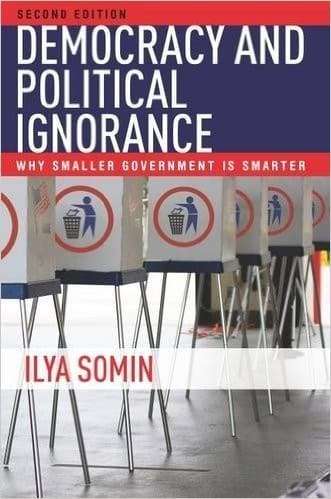The Volokh Conspiracy
Mostly law professors | Sometimes contrarian | Often libertarian | Always independent
My very first article on the dangers of political ignorance

Thanks to the wonders of modern technology, my very first article on political ignorance - "Voter Ignorance and the Democratic Ideal," Critical Review (1998) - is now available for free at the SSRN website. It first presented several of the ideas I developed much more fully in later work, especially my book Democracy and Political Ignorance: Why Smaller Government is Smarter. Here is the abstract:
If voters do not understand the programs of rival candidates or their likely consequences, they cannot rationally exercise control over government. An ignorant electorate cannot achieve true democratic control over public policy. The immense size and scope of modern government makes it virtually impossible for voters to acquire sufficient knowledge to exercise such control. The problem is exacerbated by voters' strong incentive to be "rationally ignorant" of politics. This danger to democracy cannot readily be circumvented through "shortcut" methods of economizing on information costs. A truly democratic government must, therefore, be strictly limited in scope.
Many of the issues raised in the article strike me as even more relevant today than they were back in the 1990s. In recent years, political developments such as the rise of Donald Trump and important new works by both libertarian and left of center scholars have led many people to start taking the problem of political ignorance more seriously than in the past.
I hope that trend will continue, even if many of the participants in the resulting debate favor solutions different from the ones I advocate. As I explained in the article, widespread voter ignorance is a major shortcoming of modern democracy and poses a serious challenge to both liberalism and influential versions of conservatism, particularly more populist ones.
Obviously, there is much in this article that I would do differently if I could rewrite it today. Unlike my later work, it does not discuss decentralization and "voting with your feet" as possible strategies for mitigating the dangers of political ignorance. I had not thought of that connection yet!
It also does not incorporate Bryan Caplan's theory of "rational irrationality" (which he had not yet published). Thus, the article makes it seem as if the only major problem is voters' ignorance of relevant information. In reality, their tendency to interpret what they do know in a highly biased way is a comparably grave challenge. In Democracy and Political Ignorance, I explained why I differ with both those who think ignorance alone is the problem and those, like Caplan, who argue that ignorance would not matter much if voters were not biased in their evaluation of the information they do get. There are also a few points in the article I just simply don't agree with anymore, because the evidence doesn't support them. For example, "political business cycles" do not seem to be as big a problem as I suggested.
More generally, I was young and inexperienced when I wrote "Voter Ignorance and the Democratic Ideal," and some parts of it clearly reflect that. Among other things, I probably tried to do too much in one article - a common mistake of younger scholars, and one I have wrestled with even in later stages of my career.
On the plus side, "Voter Ignorance and the Democratic Ideal" has helped stimulate debate over the problem of political ignorance. It remains one of my three or four most cited articles, and has been on the reading list in numerous courses at universities in the United States and abroad. I hope it will continue to be useful to a new generation of readers.


Show Comments (0)